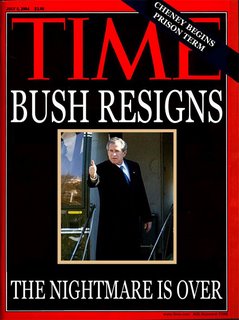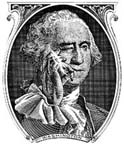3.27.2006

Democracy and Security
The Bush Doctrine is alive and well.
The Wall Street Journal / Editorial Page
March 26, 2006
The publication earlier this month of the Bush Administration's National Security Strategy was greeted with a combination of media indifference and contempt. "Bush clings to pre-emptive force," was one news agency's sum-up of the 49-page document. Readers of these columns might prefer to draw their own conclusions by actually reading it: www.whitehouse.gov/nsc/nss/2006. What they'll find is a strategy that's admirably specific and, in the issues that matter most, broadly right.
This is especially important at a time when countries such as Iran, Syria and Egypt are betting that the Administration's domestic political weakness and its troubles in Iraq will see them safely through the 2008 election and what they hope will be a more pliant U.S. foreign policy. The document may now give those regimes second thoughts. Crucially, it reaffirms the Administration's first-term support of pre-emption: "When the consequences of an attack with [weapons of mass destruction] are potentially so devastating, we cannot afford to stand idly by as grave dangers materialize."
We'll take that to mean that the Bush Doctrine remains alive and well, despite persistent reports that it had been quietly shelved in favor of . . . well, no one has yet made clear what. Critics of the doctrine have argued that America's intelligence failure and difficulties in Iraq demonstrate the perils of pre-emption. Yet it is precisely because U.S. policy makers will never have perfect information about the capabilities and intentions of our enemies that pre-emption is sometimes needed, particularly when the threats are potentially catastrophic.
What distinguishes this document, however, is the emphasis it places on "effective democracy": that is, nations in which the institutions of democracy--regular and honest elections; representative and accountable government--serve as the armature of basic political, religious and economic freedoms.
Critics have questioned whether promoting democracy really advances U.S. security interests, pointing to the recent victory of Hamas in Palestinian elections. But leaving aside that the former government of Yasser Arafat was no less bloody-minded, the objections fail to appreciate the ways in which effective democracies tend to counteract the very factors that gave rise to Hamas in the first place: Political participation takes the place of exclusion; the free flow of information and a marketplace of ideas replace "sub-cultures of conspiracy and misinformation," and so on.
None of this guarantees that elections will inevitably lead to liberal outcomes. And, yes, there are times and places (Pakistan now) where the diplomatic prod to democracy has to be measured against the help a government is providing against a more urgent enemy (al Qaeda). But the evidence of the past century is that elections usually produce more long-run stability, and they merit a try in the Middle East.
Equally useful is the strategy's clear-eyed account of the connection between the nature of a regime and its behavior. "Governments that honor their citizens' dignity and desire for freedom tend to uphold responsible conduct toward other nations," the document notes, "while governments that brutalize their people also threaten the peace and stability of other nations."
This is directly relevant to Iran, whose nuclear ambitions are mainly a function of the ideological obsessions of its rulers--and not, as is sometimes argued, of Iran's objective national interests. This means the threat Iran poses is unlikely to change as long as the regime remains the same: The "ultimate goal" of U.S. policy, therefore, is rightly an Iran which "[opens] up its political system and [affords] freedom to its people.
How this is done is another matter, and nobody is now arguing for changing the regime in Tehran the way it was changed in Baghdad. But we are heartened that the strategy begins with the declaration that "It is the policy of the United States to seek and support democratic movements and institutions in every nation and culture" (our emphasis). This puts us in mind of U.S. support for Russian refuseniks in the 1970s, Poland's Solidarity movement in the 1980s, and Kurdish autonomy in northern Iraq in the 1990s--all of which have analogs in modern-day Iran.
There is a great deal more in this document that deserves attention, notably the effort to retool the State Department into an engine of "transformational diplomacy," and not, as it usually is, the defender of every given status quo. It is also good to see the Administration belatedly recognize that Russian democracy is increasingly threatened by its own government.
Best of all is the line that "though tyranny has few advocates, it needs more adversaries." One critique of the President's push for democracy is the idea that the U.S. should not too visibly support the world's democratic dissidents and movements, lest they be tainted by American associations. But we suspect that champions of liberty in places such as Egypt, Iran and China take greater courage from an America that states its purposes boldly than one that fears its own shadow. Since when did the love of liberty become the love that dare not speak its name?
Copyright © 2006 Dow Jones & Company, Inc.
*************************************************************************************************************
From URL: http://www.opinionjournal.com/editorial/feature.html?id=110008141
The Bush Doctrine is alive and well.
The Wall Street Journal / Editorial Page
March 26, 2006
The publication earlier this month of the Bush Administration's National Security Strategy was greeted with a combination of media indifference and contempt. "Bush clings to pre-emptive force," was one news agency's sum-up of the 49-page document. Readers of these columns might prefer to draw their own conclusions by actually reading it: www.whitehouse.gov/nsc/nss/2006. What they'll find is a strategy that's admirably specific and, in the issues that matter most, broadly right.
This is especially important at a time when countries such as Iran, Syria and Egypt are betting that the Administration's domestic political weakness and its troubles in Iraq will see them safely through the 2008 election and what they hope will be a more pliant U.S. foreign policy. The document may now give those regimes second thoughts. Crucially, it reaffirms the Administration's first-term support of pre-emption: "When the consequences of an attack with [weapons of mass destruction] are potentially so devastating, we cannot afford to stand idly by as grave dangers materialize."
We'll take that to mean that the Bush Doctrine remains alive and well, despite persistent reports that it had been quietly shelved in favor of . . . well, no one has yet made clear what. Critics of the doctrine have argued that America's intelligence failure and difficulties in Iraq demonstrate the perils of pre-emption. Yet it is precisely because U.S. policy makers will never have perfect information about the capabilities and intentions of our enemies that pre-emption is sometimes needed, particularly when the threats are potentially catastrophic.
What distinguishes this document, however, is the emphasis it places on "effective democracy": that is, nations in which the institutions of democracy--regular and honest elections; representative and accountable government--serve as the armature of basic political, religious and economic freedoms.
Critics have questioned whether promoting democracy really advances U.S. security interests, pointing to the recent victory of Hamas in Palestinian elections. But leaving aside that the former government of Yasser Arafat was no less bloody-minded, the objections fail to appreciate the ways in which effective democracies tend to counteract the very factors that gave rise to Hamas in the first place: Political participation takes the place of exclusion; the free flow of information and a marketplace of ideas replace "sub-cultures of conspiracy and misinformation," and so on.
None of this guarantees that elections will inevitably lead to liberal outcomes. And, yes, there are times and places (Pakistan now) where the diplomatic prod to democracy has to be measured against the help a government is providing against a more urgent enemy (al Qaeda). But the evidence of the past century is that elections usually produce more long-run stability, and they merit a try in the Middle East.
Equally useful is the strategy's clear-eyed account of the connection between the nature of a regime and its behavior. "Governments that honor their citizens' dignity and desire for freedom tend to uphold responsible conduct toward other nations," the document notes, "while governments that brutalize their people also threaten the peace and stability of other nations."
This is directly relevant to Iran, whose nuclear ambitions are mainly a function of the ideological obsessions of its rulers--and not, as is sometimes argued, of Iran's objective national interests. This means the threat Iran poses is unlikely to change as long as the regime remains the same: The "ultimate goal" of U.S. policy, therefore, is rightly an Iran which "[opens] up its political system and [affords] freedom to its people.
How this is done is another matter, and nobody is now arguing for changing the regime in Tehran the way it was changed in Baghdad. But we are heartened that the strategy begins with the declaration that "It is the policy of the United States to seek and support democratic movements and institutions in every nation and culture" (our emphasis). This puts us in mind of U.S. support for Russian refuseniks in the 1970s, Poland's Solidarity movement in the 1980s, and Kurdish autonomy in northern Iraq in the 1990s--all of which have analogs in modern-day Iran.
There is a great deal more in this document that deserves attention, notably the effort to retool the State Department into an engine of "transformational diplomacy," and not, as it usually is, the defender of every given status quo. It is also good to see the Administration belatedly recognize that Russian democracy is increasingly threatened by its own government.
Best of all is the line that "though tyranny has few advocates, it needs more adversaries." One critique of the President's push for democracy is the idea that the U.S. should not too visibly support the world's democratic dissidents and movements, lest they be tainted by American associations. But we suspect that champions of liberty in places such as Egypt, Iran and China take greater courage from an America that states its purposes boldly than one that fears its own shadow. Since when did the love of liberty become the love that dare not speak its name?
Copyright © 2006 Dow Jones & Company, Inc.
*************************************************************************************************************
From URL: http://www.opinionjournal.com/editorial/feature.html?id=110008141
